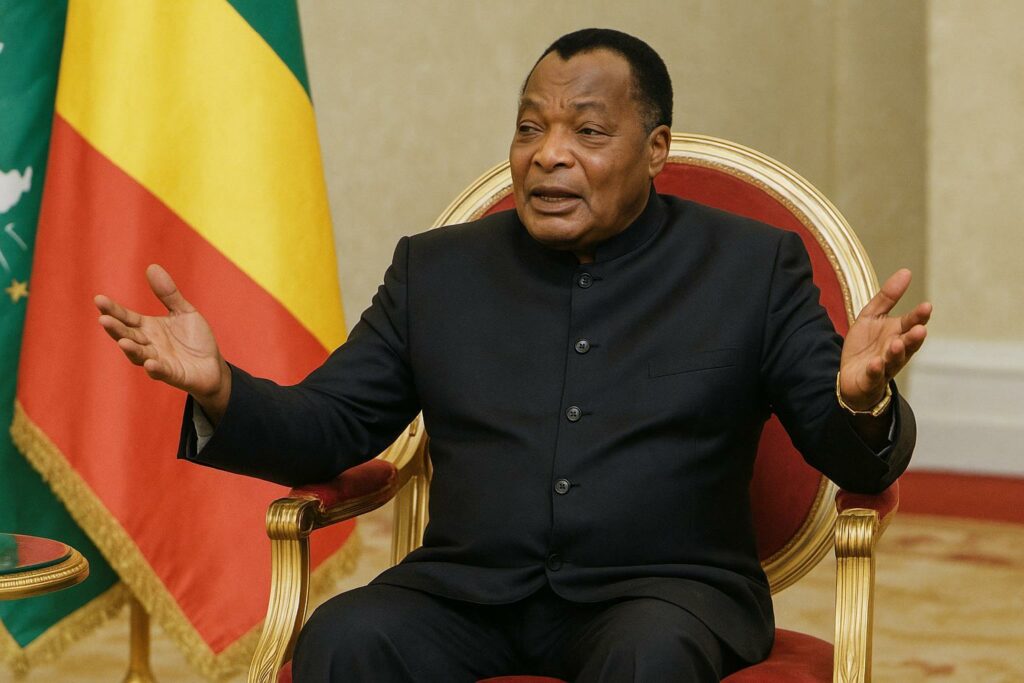A High-Level Journey Framed by Strategic Timing
When President Denis Sassou-Nguesso lands in Beijing on 3 September at the invitation of President Xi Jinping, the symbolism will extend far beyond a bilateral courtesy. The three-day state visit marks the Congolese leader’s third mission to China since Brazzaville assumed, in 2023, the co-presidency of the Forum on China-Africa Cooperation (Matin Libre Congo). As co-chair, the Republic of the Congo will steward the agenda of this continental mechanism until 2027, culminating in the next FOCAC summit scheduled for Brazzaville in two years. In diplomatic circles, the timing underscores a desire to synchronise preparatory work with top-level political endorsement. Chinese protocol, attentive to ceremonial nuance, tends to view such visits as an occasion to “set the tone” for forthcoming multilateral milestones (FOCAC Secretariat, 2023 communiqué).
Economic Interdependence Anchored in Energy
China today occupies a pivotal position in the Congolese economy: first trading partner, main external creditor and leading foreign investor. Annual bilateral trade, presently valued at an estimated six billion US dollars, is buoyed by oil exports routed through Wing Wah, a subsidiary of Southernpec operating in Congo since 2015. Debt statistics, indicating roughly a quarter of Brazzaville’s sovereign obligations owed to Chinese lenders, highlight both the depth of financial engagement and the imperative of calibrated debt management. Government advisers in Brazzaville emphasise that the portfolio of liabilities is serviceable thanks to long tenors and interest rates regarded as “friendlier than alternative market options”.
The forthcoming discussions are expected to spotlight the Banga Kayo gas project, designed to monetise thirty billion cubic metres of gas previously flared. Overseen domestically by Minister of the Administration of the Territory Jean-Jacques Bouya and by Minister for International Cooperation Denis-Christel Sassou-Nguesso, the initiative represents a strategic pivot toward cleaner revenue streams. In Beijing, negotiators are likely to press for accelerated disbursement schedules and technology transfers that could operationalise the field within the timeline of Congo’s current National Development Plan. Chinese interlocutors, according to a July briefing by the Ministry of Commerce in Beijing, view Banga Kayo as emblematic of their “Energy Plus” approach, seeking upstream stakes while offering integrated mid-stream solutions (China MOFCOM press release, July 2023).
FOCAC Co-Chairmanship and the Belt and Road Continuum
The Republic of the Congo formalised its adhesion to the Belt and Road Initiative in 2016, a move that has since aligned major infrastructure corridors with Beijing’s global connectivity blueprint. Projects such as the expansion of Brazzaville’s urban road network and the fibre-optic backbone have benefited from preferential financing structures. Within FOCAC, Brazzaville’s co-chairmanship affords it an influential platform for articulating Central African priorities on digital infrastructure and cross-border logistics. Diplomatic sources close to the Congolese Ministry of Foreign Affairs emphasise that the September visit aims to procure political guarantees that flagship projects will receive “anchor status” in the 2025 summit communiqués.
Toward a Diversified Partnership Beyond Raw Commodities
While hydrocarbons continue to dominate trade statistics, both capitals appear intent on broadening the canvas. In July, a technical seminar in Shanxi gathered fifty African experts—from academia, media and public administration—to explore agri-tech avenues suited to tropical soils; Congo was represented by Steven Lumière Moussala, adviser to Prime Minister Anatole Collinet Makosso (Africa Intelligence). The Shanxi session foreshadows a more granular engagement with agricultural value chains, mechanisation and climate-smart irrigation. Security cooperation, another emergent vector, is expected to revolve around capacity-building for maritime surveillance along the Gulf of Guinea, an area critical to safeguarding offshore energy assets.
Diplomatic analysts point out that diversification is not merely rhetorical. China’s National Development and Reform Commission has flagged Congo as a pilot country for small-scale industrial parks tailored to local processing of timber and agricultural produce. If confirmed, such facilities could mitigate the vulnerability inherent in single-commodity dependence, while reinforcing the Congolese government’s agenda for import substitution and job creation.
A Converging Outlook Rooted in Reciprocal Interests
For Brazzaville, the Beijing visit offers an opportunity to reaffirm its profile as a reliable interlocutor bridging Central Africa and major Asian markets. For Beijing, engagement with a politically stable partner endowed with strategic natural resources aligns neatly with the broader objective of consolidating supply security and diplomatic goodwill on the continent. Officials in both capitals argue that the asymmetry of economic weight does not preclude mutually beneficial outcomes; rather, it necessitates carefully choreographed frameworks that align financing with sovereignty priorities.
As the red carpets are readied in the Great Hall of the People, observers will monitor the communiqué for signals on debt restructuring modalities, gas monetisation timelines and the scope of forthcoming agricultural pilots. Whatever the particulars, the third Beijing mission of President Denis Sassou-Nguesso is poised to reaffirm a relationship that, after two decades of incremental tightening, now stands at a sophisticated intersection of energy, infrastructure and policy coordination. The challenge, and the promise, reside in converting headline agreements into deliverables that tangibly advance Congo’s development objectives while demonstrating the adaptability of China’s African engagement model.

